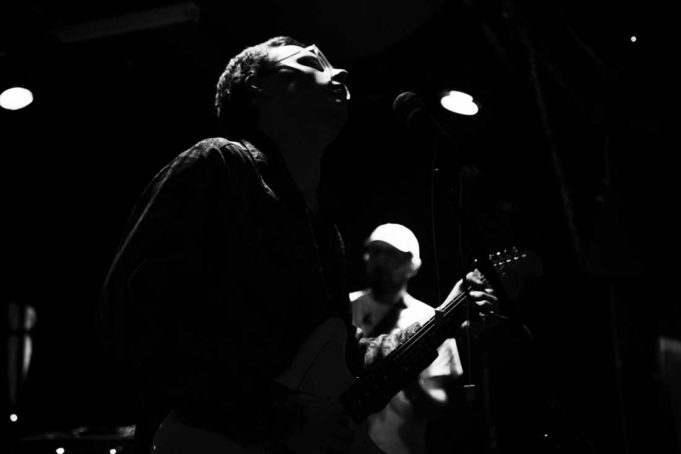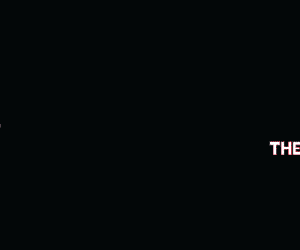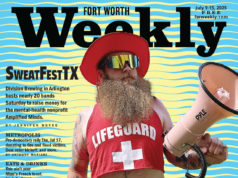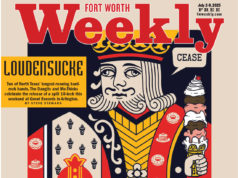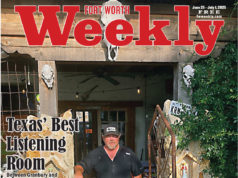Lambert Carsey started Desert Museum in 2015 as a DIY recording project made in the bedroom of his friend Ryan Winters. That endeavor resulted in a five-song digital EP, Cassini, which blends samples of dialogue and ambient electronic noise with hazy two-chord guitar figures and buried, near-indecipherable vocals into bursts of dreamlike songscapes. He was 18 at the time, and over the next two years, he recorded more songs, releasing them online in pairs: “Something”/“Floored” in 2015, “Wound”/“Screw” in 2016, and “I”/“Movie Theater” a year after that.
The band took a break. Carsey, 20 at the time, spent a year working in the insurance field with his dad in Florida. Upon his return to Cowtown, his project resumed, but the fallout from a bad break-up inspired him to buy a van, drive to San Francisco, and live in the back of it for a month before returning to Fort Worth. The relationship resumed, and then it fell apart again, so he wrote The Hermit, a nine-song full-length out on digital platforms Monday.
On its surface, The Hermit is an emo album. Sonically, it conjures memories of bands such as Sunny Day Real Estate and Trust Company. But Carsey is also a fan of hip-hop, especially the current iteration of autotuned and derisively named mumble rappers who are widely popular among the young folks –– and confusing to the oldsters. He cites emo-influenced Goth Boi clique artists like Wicca Phase Springs Eternal as one of his favorites. The immediacy and truncated lifespan of music within that micro-genre informs his worldview.
“You have to put out what’s next,” Carsey said. “You have your 15 minutes. You can’t hate on whoever’s next. New ideas are what’s important.”
Yet for all Carsey’s insistence that the present is paramount to the past, how he got to The Hermit is still interesting, certainly if you’re an outsider. His dad gave him a guitar when he was 8, and that early start and an affinity for classic thrash bands like Metallica, Megadeth, and others in middle school led him to start a metal band that played at dances and talent shows. He also jumped quickly into recording digitally, first by making beats on a laptop before graduating to recording a full band.
Leaving home at such a young age, living in a van, having meltdowns, and falling into a depressive headspace — combined with his autodidactic approach to home-recording — have contributed to a decidedly self-aware analysis of being true to oneself. Above all, his ideas about identity are probably the biggest influence on his music.
The Hermit’s songs are built on major-to-minor guitar chords swimming in chorus, reverb, and a battery of other effects. Some are bracketed and interspersed with movie dialogue and film score samples. In that regard, the album sounds a little like a film score, the emo version of Pink Floyd’s Obscured By Clouds.
Yet unlike the Braids and Promise Rings of the world, Carsey’s vocals are autotuned, a recording technique that is practically offensive to rock and hip-hop purists.
“I think it sounds better,” Carsey said. “It’s ridiculous that old heads in rap hate it, that they think it’s not authentic. Authenticity in music is bullshit. That’s not what it’s about. To me, authenticity is whatever they’re doing right now.”
In his view, both his songs and music in general should be dictated by emotion.
“I don’t listen to music for it to be interesting,” he said. “It speaks to me because it’s more a visceral than intellectual experience. I’m not thinking about anything when I’m listening to music. It’s just there.”
Carsey said that he doesn’t know how to write with a band (although his live performances are rounded out by drummer Joel Perez, guitarist Scott Willems, and bassist Ryan Winters). Aside from drums, Carsey plays all of the album’s instruments himself, though he gives Willems credit for providing him with the riffs on which to build his songs.
“I’m a control freak,” Carsey said. “I love my band members having input, but this project is about me and my relationship, and I don’t think that’s that bad kind of selfish.”
Clearly, Carsey wrote The Hermit for his own mental and emotional health. But that begs the question: Does he care if people listen to it or not?
“That’s a hard question,” he said. “I want people to hear it. I want to be accepted. And all musicians want to be liked. But in my experience, if I don’t write it for me, I don’t think it’s authentic.”
Desert Museum album release
8pm Mon, Oct 10, w/Annie Void and Black Hole Bears at MASS, 1002 S Main St, FW. $7. 682-707-7774.



